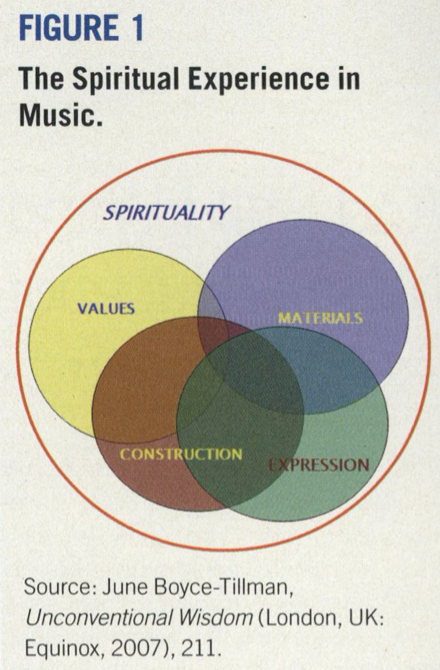In 2013 June Boyce-Tillman wrote an article for Music Educators Journal, “And Still I Wander … A Look At Western Music Education Through Greek Mythology.” Boyce-Tillman pointed out that searching for spiritual experience has long been central to the human experience, and that music is often a part of spiritual practices. Drawing on Greek myths, Boyce-Tillman sheds light on Western music education. For classical Greece, the idea that humans have souls is central, and psychoagogia (“the leading the the soul” p. 30) was a process to greater understanding and empathy. This process involves rationality and intuition. The human body is placed at the center of the sensory experience of beauty. This leads Boyce-Tillman to her four-part model of spirituality (I copied the image from the article).
- Material: Music is drawn from the material human body and the environment. Boyce-Tillman suggests the material experience is often reduced to mere technical skill in much music education (including Carl Orff and John Blacking in her critique). “The close relation of musical experience to the natural world is simply ignored. We could transform ecological understanding at a stroke if we taught all our violin students to open their instrument cases and honor the tree that gave its life for the instrument” (pp. 30-1).
- Expression: She suggests that in England early childhood education does this well, but people involved in educating younger students might look to music therapy, “as a means of deep inner self-exploration rather than therapeutic attendance of the participants’ psychopathological needs” (p. 31).
- Construction: She suggests improvisational elements of delight and play be centered in the curriculum.
- Values: Values involve searching for that which is good. And she suggests we don’t talk about the Good often enough, even when we perform music that opens space to discuss the good. Values are connected to culture.
In previous posts, I have given examples of music performed in schools where values are never discussed. Space isn’t opened for conversation or understanding . Student improvisation and composition is often avoided by many music teachers—or narrowed to the point where it’s not very creative at all, just answers to be plugged into a preset question. But material is perhaps our biggest area of contention.
Music teachers ought to teach our students where our instruments originate. We ought to seek that information out for ourselves. It doesn't appear by magic. I'll draw your attention to a 2015 article in Popular Music, where Kyle Devine tracks down the waste involved in LPs, cassettes, CD’s, and MP3s, including the destructive material waste of our most seeming-immaterial musics, in the form of server farms. A spiritual approach, following Boyce-Tillman’s model, isn’t immaterial. It begins with the material. The material is the first consideration, even if the material has been ignored by most of music education. A return to the spiritual is a return to awareness of our material footprint. Conscientization.
DS

 RSS Feed
RSS Feed
